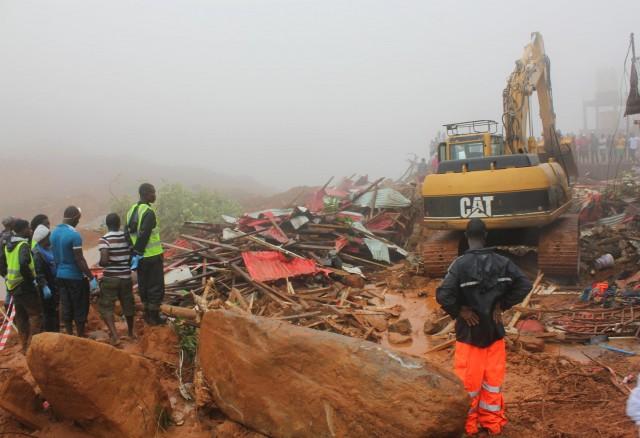Nearly 400 bodies uncovered from Sierra Leone mudslide — coroner

FREETOWN - Rescue workers have recovered nearly 400 bodies from a mudslide in the outskirts of Sierra Leone's capital Freetown, the chief coroner said on Tuesday, as rescue operations continued and morgues struggled to find space for all the dead.
President Ernest Bai Koroma urged residents of the town of Regent and other flooded areas around Freetown to evacuate immediately so that military personnel and other rescue workers could continue to search for survivors who might be buried underneath debris.
Dozens of houses were covered in mud when a mountainside collapsed in Regent on Monday morning, one of the deadliest natural disasters in Africa in recent years.
"As the search continues, we have collected nearly 400 bodies - but we anticipate more than 500," chief coroner Seneh Dumbuya told Reuters.
Bodies continued to arrive at the city's overwhelmed central morgue on Tuesday. Corpses were lying on the floor and on the ground outside for lack of room, a Reuters witness said.
"Our problem here is space. We are trying to separate, quantify, and examine quickly and then we will issue death certificates before the burial," said Owiz Koroma, head of the morgue, who also estimated the death toll to be in the hundreds.
To relieve pressure on the morgue, authorities and aid agencies were preparing to bury the bodies in four different cemeteries across Freetown on Wednesday, said Idalia Amaya, an emergency response coordinator for Catholic Relief Services.
Medecins Sans Frontieres is providing hundreds of body bags to authorities that the medical charity kept in Sierra Leone after the 2014-16 Ebola outbreak which killed 4,000 people in the former British colony.
FEAR OF DISEASE
Sierra Red Cross Society spokesman Abu Bakarr Tarawallie said by phone he estimated that at least 3,000 people were homeless and in need of shelter, medical assistance and food. The Red Cross said another 600 were missing.
"We are also fearful of outbreaks of diseases such as cholera and typhoid," he told the Thomson Reuters Foundation from Freetown. "We can only hope that this does not happen."
Contaminated water and water-logging often lead to potentially deadly diseases like cholera and diarrhoea after floods and mudslides.
Crowds of people gathered, waiting for news of missing family members.
"I've been looking for my aunt and her two children, but so far no word about them," said Mohamed Jalloh, crying. He said he feared the worst.
President Koroma said in a television address on Monday evening that rescue centres had been set up around the capital to register and assist victims.
Bulldozers dug through mud and rubble at the foot of Mount Sugar Loaf, where many residents had been asleep when part of the mountainside collapsed. The government said a number of illegal buildings had been erected in the area. — Reuters




